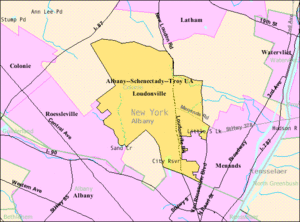Loudonville, New York facts for kids
Quick facts for kids
Loudonville
|
|
|---|---|
|
Hamlet and CDP
|
|

Loudonville census-designated place (CDP) in 1990
|
|
| Etymology: For John Campbell, 4th Earl of Loudoun | |
| Country | United States |
| State | New York |
| Region | Capital District |
| County | Albany |
| Settled | 1830 |
| Area | |
| • Total | 5 sq mi (10 km2) |
| Elevation | 348 ft (106 m) |
| Population
(2020)
|
|
| • Total | 10,296 |
| • Density | 2,060/sq mi (800/km2) |
| Time zone | UTC-5 (EST) |
| • Summer (DST) | UTC-4 (EDT) |
| ZIP Code |
12211
|
| Area code(s) | 518 |
Loudonville is a small community called a hamlet in the town of Colonie, located in Albany County, New York. It is part of the United States. A hamlet is a small settlement, usually without its own local government.
Loudonville has also been recognized as a census-designated place (CDP) at different times. This means the U.S. Census Bureau defines it as a specific area for counting people. It was a CDP in 1970, 1980, and 1990. It stopped being a CDP in 2000 but became one again in 2020.
Contents
The Story of Loudonville
| Loudonville Historical Populations | ||
|---|---|---|
| Year | Pop. | ±% |
| 1970 | 9,299 | — |
| 1980 | 11,480 | +23.5% |
| 1990 | 10,822 | −5.7% |
| Sources: Censuses 1970 and 1980; and 1990. | ||
Loudonville gets its name from John Campbell, 4th Earl of Loudoun. In the 1800s, it was a popular summer getaway for some of the richest families from Albany.
The main road, Loudon Road, was once called Old Plank Road. It has many old, grand houses built in the Jeffersonian style. Loudonville began as a small community along Loudon Road, where it met Crumitie Road.
Further north, there was another small community called Ireland's Corners. It had its own post office. Ireland's Corners was named after Elias H. Ireland, who bought the land in 1832. In 1871, the post office at Ireland's Corners was renamed Loudonville.
Where is Loudonville?
Loudonville is located just north of the city of Albany. It is south of another community called Newtonville.
The center of Loudonville is around what used to be Ireland's Corners. This is where U.S. Route 9 crosses Osborne Road and Menand Road. Even though hamlets often have unclear boundaries, the census-designated place of Loudonville has specific borders.
Nearby Areas
 |
Hamlet of Newtonville | Hamlet of Newtonville | City of Watervliet |  |
| Hamlet of Roessleville | Village of Menands | |||
| Hamlet of West Albany | City of Albany |
Important Places to See
Loudonville is home to several interesting landmarks:
- Siena College: This is a private college with a Roman Catholic background. It is run by the Franciscan religious order.
- Schuyler Meadows Club: This club was started in 1926 by Loudonville residents. They wanted a golf club closer to home. The clubhouse, built in 1927, looks like the middle part of George Washington's famous home, Mount Vernon.
- Several historic buildings and areas in Loudonville are listed on the National Register of Historic Places. This means they are important for their history or architecture. These include the Bryan's Store, D. D. T. Moore Farmhouse, Gorham House, Hughson Mansion, Loudon Road Historic District, Springwood Manor, Wheeler Home, Holub Home, Friend Humphrey House, and Whitney Mansion.
Famous People from Loudonville
Some well-known people have connections to Loudonville:
- Roger McNamee: He is a successful investor who grew up in Loudonville. He helped start important investment companies like Elevation Partners and Silver Lake Partners.
- Henry Reed Rathbone: He was present during the assassination of President Abraham Lincoln. He lived on Cherry Tree Road in Loudonville.
- Joan Vollmer: She was a notable figure in the beatnik movement and was married to the famous writer William S. Burroughs.
- James H. Fallon: He is an American neuroscientist and author.
- The Right Rt. David S. Ball: He was a bishop for the Episcopalian Diocese of Albany.
 | James Van Der Zee |
 | Alma Thomas |
 | Ellis Wilson |
 | Margaret Taylor-Burroughs |


